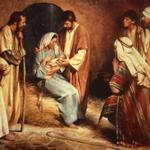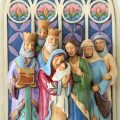When Mormon author Jason Wright wrote a book about Christmas, some people were surprised. One woman asked him how he reconciled the writing of a Christmas book when Mormons don’t celebrate Christmas. He quickly explained that Mormons do celebrate Christmas.
The actual name of the Mormon Church is The Church of Jesus Christ of Latter-day Saints. Mormon is a nickname, initially given to Mormons by their enemies, but later good-naturedly accepted as a nickname by Mormons themselves. It comes from the name of a book that is used as a second witness of Jesus Christ, the first witness, of course, being the Bible. The Book of Mormon helps to serve as an independent witness of the truthfulness of the Bible. Mormon was one of the last writers of this book, but it is not Mormon’s church. It is Jesus’ church, and so the true name of the church must, of course, include Jesus Christ’s name.
Mormons believe that Jesus Christ is the literal and only-begotten Son of God and is also the son of the mortal Mary. This duel heritage gives him the mortality to experience physical suffering, emotions, and death, but the divinity required to atone for the sins of others and to overcome death. Mormons beliefs do not include the trinity because the trinity is a post-biblical belief that was agreed to in a council and merely voted into being by men. Mormons do not put doctrine to a vote. They received their information on the natures of God and Jesus in the same ways God gave man information in ancient times. “Surely the Lord God will do nothing, but he revealeth his secret unto his servants the prophets (Amos 3:7). The Bible never says prophecy will end when Jesus dies or that revelation and truth will ever come in any other way, including elections. It appears to be a tradition with no Biblical evidence.
Our first and foremost article of faith in The Church of Jesus Christ of Latter-day Saints is “We believe in God, the Eternal Father, and in His Son, Jesus Christ, and in the Holy Ghost.” We believe these three divine persons constituting a single Godhead are united in purpose, in manner, in testimony, in mission. We believe Them to be filled with the same godly sense of mercy and love, justice and grace, patience, forgiveness, and redemption. I think it is accurate to say we believe They are one in every significant and eternal aspect imaginable except believing Them to be three persons combined in one substance, a Trinitarian notion never set forth in the scriptures because it is not true.
Indeed no less a source than the stalwart Harper’s Bible Dictionary records that “the formal doctrine of the Trinity as it was defined by the great church councils of the fourth and fifth centuries is not to be found in the [New Testament].”
So any criticism that The Church of Jesus Christ of Latter-day Saints does not hold the contemporary Christian view of God, Jesus, and the Holy Ghost is not a comment about our commitment to Christ but rather a recognition (accurate, I might add) that our view of the Godhead breaks with post–New Testament Christian history and returns to the doctrine taught by Jesus Himself. — Jeffrey R. Holland, “The Only True God and Jesus Christ Whom He Hath Sent,” Ensign, Nov 2007, 40–42
Although it is true that Jesus said He and His Father were one in John 14, he also said, in the same chapter, in verse 20: “At that day ye shall know that I am in my Father, and ye in me, and I in you.” In other words, God, Jesus, and the Apostles are one in the same way—they are entirely unified. He didn’t mean the apostles were part of the trinity. The Bible is filled with references in which Jesus spoke of God, always as a separate being, and not as Himself. He prayed to God, He praised God. He is not likely to have prayed to or praised Himself.
And so, Mormons believe in Jesus Christ. They believe He atoned for their sins in the Garden of Gethsemane and died on the cross for them, rising again the third day and breaking the bands of death for all of us. He made it possible for us to repent and to be forgiven. This is at the heart of Mormon doctrine, which teaches that God loves us and created our spirits, making us His literal children. He is, in every respect, a perfect father. He allows us freedom to make our own choices, but as every parent knows, children can choose what to do, but cannot choose the consequences. When a child misbehaves, there is a price to be paid for it, and so it is for us, as God’s children. We can obey or disobey, find and accept truth or reject it, but always, we accept that the consequences for those choices are out of our hands. This means God is a Father with rules that have consequences, either good or bad, and He allows us to experience suffering because it is part of our growth and because to prevent us from having suffering, we would have to give up all agency and become mere puppets in God’s hands.
Because He loves us, He sent His Son, Jesus Christ, to come to earth to do for us what we could not do for ourselves, and while Easter is traditionally the time to honor that extraordinary sacrifice, Mormon beliefs remind us that Christmas matters only because there was an Easter. Christmas honors the birth of a child who willingly came to earth, knowing there would be both joy and heartache in the short life He would live. It also honors the earthly mother who endured the judgments that might have come from this miraculous pregnancy and who worked hard to raise a son who would be prepared to carry out His mission. It also honors Joseph, who made the right choice of faith in a difficult situation and who lovingly accepted this young Savior into His home, filling the role of Jesus’ earthly father.
Christmas honors the humble shepherds who saw an angel and believed immediately, even though many others have rejected heavenly visitations. It honors wise men who spent their lives waiting for Jesus to be born and who then spent years reaching him. They saved his life by accepting heavenly counsel to avoid returning to a wicked king who wanted to kill Jesus.
Christmas is a time when Mormons and other Christians can renew their commitment to Jesus Christ by giving Him gifts that matter for eternity. While the more secular celebrations are a fun part of the holiday, they often have their foundations in the spiritual and can be approached in that manner. When we give material gifts at Christmas, we are reminded there are many gifts that need to be given, both material and spiritual, all year long and they help us to remember the most important gift—the one God gave us when He sent His Son to us.“On Calvary’s hill He gave His life for each of us. That is the greatest gift that any of us can ever receive. It is the gift of the Resurrection and eternal life.
We honor His birth. But without His death, that birth would have been but one more birth. It was the Redemption which He worked out in the Garden of Gethsemane and upon the cross of Calvary which made His gift immortal, universal, and everlasting. His was a great Atonement for the sins of all mankind. He is the Resurrection and the Life, ‘the firstfruits of them that slept’ (1 Corinthians 15:20). Because of Him all men will be raised from the grave.
We love Him. We honor Him. We thank Him. We worship Him. He has done for each of us and for all mankind that which none other could have done. God be thanked for the gift of His Beloved Son, our Savior, the Redeemer of the world, the Lamb without blemish, who was offered as a sacrifice for all mankind” (missionary devotional, Dec. 15, 2002). (See Gordon B. Hinckley, “Inspirational Thoughts”, Liahona, Sept. 2007, 2–6.)
About Terrie Lynn Bittner
The late Terrie Lynn Bittner—beloved wife, mother, grandmother, and friend—was the author of two homeschooling books and numerous articles, including several that appeared in Latter-day Saint magazines. She became a member of the Church at the age of 17 and began sharing her faith online in 1992.






